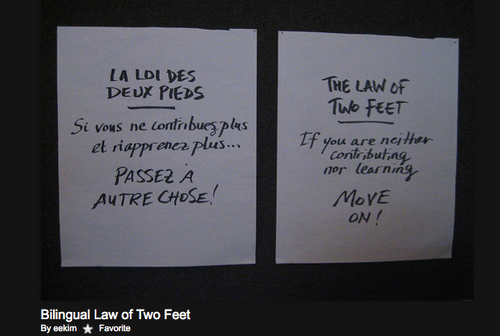Bilingualism: The English Immersion Project
The French students' lack of knowledge of the English language has been a preoccupation for our government for many years now. Recently, our Prime Minister Jean Charest announced an expansion of a new English immersion program for sixth graders in Quebec's francophone schools. Such a system already exists but it is available only to a small number of students whom have the capacities needed to be able to achieve a complete curriculum in five months. A better knowledge of English is certainly mandatory; however, the implementation of an English immersion program to every French school in Quebec will undoubtedly fail.
Our Prime Minister announced the establishment of the English immersion program on many TV shows recently without providing information on the method that they would use to implement it throughout Quebec. Already the Quebec separatists are rebelling against the project with one legitimate question: why should English be promoted more than French? The separatists are arguing that since French students would have an intensive learning of the English language, the same should happen in English schools but with an immersion in French. This would also promote a better knowledge of French in the English community of Quebec. This makes sense to me because if our goal is to promote bilingualism in Quebec, then everyone should have the chance to learn their second language using the same programs. As the project becomes a reality, the French militants will certainly raise many objections against the immersion program.
Parents might also become a barrier to the implementation of this immersion program for a very simple reason; they are tired of being the victims of new programs that are not implemented correctly. I consider it is a lot to ask of the parents who have lived with the school reform and who were completely unsatisfied with the results. There is also the fact that a majority of parents might not even be able to help their kids go through the English immersion phase of the program simply because many Francophones in Quebec are not fluent in English. I believe the parent's frustration will put a stop or will at least slow the implementation of Charest's new immersion program.
The parents might not be the only ones opposing the government's implementation of the program; we can only imagine that the teachers will feel exactly the same way. The English immersion program already exists in our francophone schools with specialized teachers that possess the abilities to teach both the whole regular curriculum in five months and the other half of the year of intensive English. Currently, there are not enough specialized teachers to teach English immersion everywhere in Quebec. Philip Authier, writer for the Montreal Gazette, quotes Pauline Marois leader of the Parti Québécois (PQ): "Marois said it could be technically impossible to run such a program, as not all Grade 6 teachers in the francophone system are equipped to teach English."(Authier) This is true, and already some teachers fear that they will be replaced because of that. The question that everyone is asking is: where will they find the specialized teachers and how much will we have to pay for the implementation of this new program? Those are valid questions that our leaders will have to answer.
The lack of available teachers will not be the only concern that the government will be faced with in order to implement their new program; one of the biggest issues will be the students. I was in the English immersion program in sixth grade and let me tell you it was not easy, first they asked that we learn a lot in a short amount of time but it was especially hard because our knowledge of English before starting the immersion was usually nonexistent. The worst thing with the program was the three hours of homework we had each day; it is something that could never be achieved by students with learning disabilities. The teachers already struggle to teach the regular curriculum in a year and now they want to put that much more work on their shoulders and on the shoulders of their students. It is simply not realistic to ask students to be a part of a school year so intensive without taking their abilities in consideration. If a child has difficulties undergoing a regular year, what can we expect him to achieve if we give him half the time needed to learn the same amount of subjects? Seriously, we have to be realistic and recognize that an intensive English immersion is not possible for every student; other instances have made it clear that this program should not be made mandatory because of the children who are faced with learning disabilities. A program that does not take in account all of the participants is doomed to fail.
In the end, we can only imagine what damages the application of this program could make to our French school system. The problem is not that they are planning to improve the teaching of English in francophone schools; on the contrary people have been arguing favorably about this for years, the real problem is that they are doing it incorrectly. If the government would only open its eyes and take a minute to think things through, they might realize that their project is impossible, and that they cannot ask so much from our teachers and our children just for the sake of politics. While I believe English learning should be improved greatly, I doubt Charest's project will bring anything good in the French school system.
Works Cited
1- Authier, Philip. "English immersion
programs to expand in Quebec." The
Montreal Gazette. February 24, 2011. Copyright The Montreal Gazette. Web.
March 18, 2011.
2-Image source: Flickr

Leave a comment